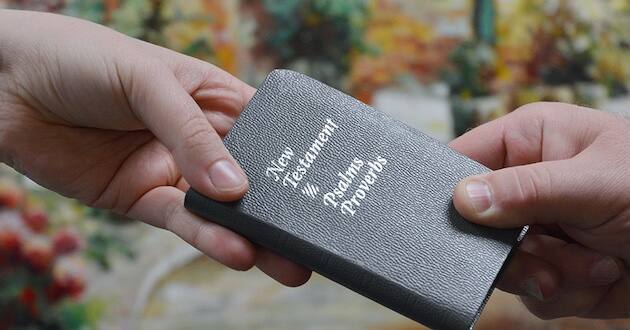The American Civil Liberties Union is alleging that a Kansas school district allowed Gideons International to distribute those little multi-colored New Testaments to students, violating the First Amendment.
However, previous court rulings already give outside groups the ability to distribute information, including bible literature.
Here’s what happened in Kansas
Before Dreesen’s visit, Struebing told staff she would visit classrooms at the roughly 250-student school to inform students that someone would be offering bibles. The distribution caused parents of one student to complain about the visit to the ACLU.
Bennett claims that Struebing allowed Dreesen on school grounds during school hours, accompanied him while he passed out Bibles to students and involved fellow school district staff in the matter. The principal lent her “credibility and authority” to Dreesen, “in effect placing a stamp of approval on his message and subjecting students to a religiously coercive atmosphere,” Bennett wrote.
READ: How Gideon Bibles came into hotel rooms and why they’re disappearing
“Our district is committed to welcoming all religious viewpoints, not promoting any specific one,” Knedler said in the statement. “We continue to review our practices and policies to ensure they reflect this commitment.”
Pew Research reports that in 1952, in Zorach v. Clauson, the Supreme Court “upheld an arrangement by which public schools excused students during the school day so they could attend religious classes away from school property.” That’s a case about bible instruction.
Fast-forward to the Kansas case and the Gideons in which Bibles were freely handed out to any who wanted them at recess, not in the confines of a classroom instruction setting. The courts have likewise ruled that if the Boy Scouts or a community sports team may distribute material promoting out-of-school programs, distribution of similar religious material, like the Bible, must also be permitted.
Gideons responded to similar case in Georgia
In a Georgia case where Gideon’s were later banned from distributing the Testaments, Sam Siple, chief program advancement officer for the Gideons, said The Gideons International make testaments available to students worldwide from fifth grade all the way through college.
“We understand that on occasion there are groups that pressure school authorities to prohibit the free distribution of Scriptures,” he wrote in an email. “Accordingly, we understand the difficult position these officials are in and respect their decision, as we pray for our community leaders and that the Lord will provide other means to share testaments.”
The Gideons, based in Nashville, Tennessee, distribute over 80 million Bibles each year and more than 75 percent distributed internationally are handed to students.
Still some districts continue to be influenced by threats of lawsuits. Someo high-power religious discrimination organizations remain firm that the practice can be legal in most cases.
What thet Anti-Defamantion League says
According to the Anti-Defamation league:
“Third-party materials or publications of a religious viewpoint may be distributed on- campus to the same extent distribution of third-party secular materials is permitted. However, courts have applied different rules to distribution of uniquely religious documents such as the Bible. A school can prohibit on-campus, distribution of third-party religious materials by implementing a universal prohibition of on-campus distribution of third-party materials.”
The nonpartisan website FindLaw.com summarized the legality of Bible distribution in schools reporting that if districts wish to allow for religious materials to be made available to students, the school board must first adopt a policy that allows for the same access to any group who wishes to provide information to students. The policy also should address how information of a religious nature will be made `available,’ as opposed to information of a non-religious nature which can be ‘distributed.’ Additionally, specific steps should be outlined, such as those adopted in the Peck case, to ensure neutrality.
“Policies should provide for the discretion to deny requests to distribute or make information available. However, the district may not arbitrarily deny requests because the district disagrees with the content of the materials. Denials normally would need to be based on objective criteria, such as the illegality of an activity being promoted in the materials.”
–Dwight Widaman | Metro Voice
